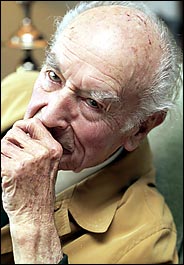
Albert Hoffman as World Traveler
I've always supported the idea of world travel as a way for anybody and everybody to learn about the similarities between international cultures, and help spread the ideas of peace and prosperity through mutual understanding. Jon Carroll, our local columnist here in San Francisco, passes along a great idea: kids should be able to spend a year or more on the road and get college credit for their roadside education. Personally, I probably learned more about life by traveling than by the four years I spent pursuing a degree in Economics from the university, so I think everyone should hit the road for an extended period and open their eyes to the wonders of this world.
The wonderful Nicholas Kristof of the New York Times (who will, rumor has it, win the Pulitzer Prize this year, and good for him) has made a modest proposal. I could paraphrase it, but I'll just quote it:
"Traditionally, many young Britons, Irish, Australians and New Zealanders take a year to travel around the world on a shoestring, getting menial jobs when they run out of money. We should try to inculcate the custom of a 'gap year' in this country by offering university credit for such experiences.
"So here's my proposal: Universities should grant a semester's credit to any incoming freshman who has taken a gap year to travel around the world. In the longer term, universities should move to a three-year academic program, and require all students to live abroad for a fourth year. In that year, each student would ideally live for three months in each of four continents: Latin America, Asia, Africa and Europe."
I endorse the idea without reservation. About 20 percent of Americans own passports (that's an informed guess -- despite what you've read, that figure is not readily available), and a somewhat smaller percentage actually use them. I think there are lots of reasons for that, including geography -- unlike Europeans, we have to travel quite a way just to find a border to cross.
But there's xenophobia too; we seem to be a fearful lot. People who don't speak English scare us; people who don't have a lot of money scare us; people who eat organ meats scare us. Things can look dire in photographs, more dire than they are in person. And anyway, dire is not by itself life-threatening. People who live in the worst slums are, by and large, alive at the end of every day. Christians traveling in Muslim countries are, similarly, healthy -- and well fed -- when the clock strikes 12.
Even when Americans do travel, they tend to travel in groups. There is a huge English-speaking tourist bubble in almost every large city, and many people never get outside it. They see the sights, but they don't see the country. (The citizens of another famously xenophobic country, Japan, likewise tend to travel in packs; until very recently, the solitary Japanese traveler was as a rare as a nuthatch in Nome.)
I taught on a high-end cruise once, and at each port of call the travelers were ushered off the boat to a pricey hotel restaurant, then taken to an equally pricey mall for an afternoon of shopping. I still remember hanging over the rail in Mumbai, watching porters struggle with huge ceramic elephants that were going to be carted up and brought back home. Progress: It is now less acceptable to bring back the pretty parts of dead elephants.
Jon Carroll at SF Chronicle Link




0 Response to 'World Travel as College Credit'
Post a Comment